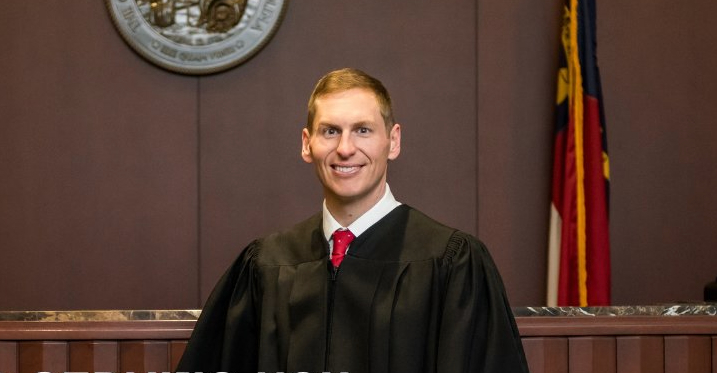N.C. Court of Appeals Judge Jefferson Griffin, a captain in the N.C. Army National Guard, will seek the GOP nomination for state Supreme Court in 2024.
Beginning in January the state’s highest court will consist of five Republicans and two Democrats. Baring unusual circumstances, Democrats can’t retake the majority on the court until the 2028 election.

Griffin will run for the seat currently held by Democrat Justice Mike Morgan.
“North Carolina has a tremendous justice system that I hope to continue to improve,” Judge Griffin said to CJ. “My time as a prosecutor in Wake County, my judicial experience, and my current service as a captain in the North Carolina Army National Guard gives me great perspective to continue to serve my state on the Supreme Court.”
Griffin was born and raised on a farm in Nash County. He graduated from Northern Nash High School, where he was captain of the football team.
In 2015, Jefferson was appointed by Gov. Pat McCrory to be a District Court judge in Wake County. Griffin was elected to a four-year term in 2016.
Griffin was endorsed by the state Republican Party for Appeals Court in 2018, a race he lost when two Republicans split the vote in a general election against one Democrat. That election took place under bizarre judicial election rules in effect for 2018 only.
Griffin was elected statewide to an eight-year term on the N.C. Court of Appeals in November 2020.
“I took an oath to protect and defend the Constitution as a U.S. soldier, Appeals Court judge, District Court judge, prosecutor, and practicing attorney. My loyalty lies with the Constitution and the rule of law. I believe judges should uphold the Constitution and not legislate from the bench. I will continue to defend the Constitution and respect the separation of powers on the North Carolina Supreme Court. I am excited about our campaign and look forward to sharing our message with the citizens of North Carolina,” said Griffin.
Morgan has yet to announce his plans for 2024.
In 1994, Democratic Gov. Jim Hunt appointed Morgan to the Wake County District Court. He was retained by voters in 1996 and again in 2000 before winning election to Superior Court in 2004. He was elected to a second Superior Court term in 2012. Morgan was elected to his first term on the state Supreme Court in 2016. Should Morgan decide to run for re-election to the state’s highest court he could serve only three years of the eight-year term. Morgan will turn 72, the state’s mandatory retirement age for judges, in October 2027.
Morgan is well-regarded in Democratic circles. Democrats have recently been floating his name as a possible candidate for governor or state attorney general. Morgan served 10 years with the state Department of Justice after graduating from law school before being appointed an administrative law judge with the N.C. Office of Administrative Hearings in 1989. It is unknown if he is interested in seeking higher office, much like his colleague, former Chief Justice Cheri Beasley, just did in her failed attempt to win a seat in the U.S. Senate.
Griffin turned some heads last year when, as an appellate judge, he criticized Beasley’s previous comments about unfair treatment of minorities in the state judicial system.
In a concurring opinion in the case State v. Johnson, Griffin wrote:
“Defendant’s brief implies that U.S. citizens are treated differently under our laws based on the color of their skin. I reject this argument. The law is color blind and applies equally to every citizen in the United States of America. This argument in Defendant’s brief is inflammatory and unnecessary.”
“It is hard to blame Defendant for raising this argument,” Griffin added. “The brief quoted North Carolina Chief Justice Beasley, who also implied in a speech on 2 June 2020 that our justice system does not treat people equally in the courtroom based on the color of their skin.”
“This statement from the former Chief Justice has motivated Defendant in this case to assert that ‘[o]ur Constitution gives this Court the legal authority to carry out our Chief Justice’s pledge.’ Defendant’s statement highlights the problem with the judiciary becoming involved in public policy.”
Speaking as chief justice, after an appointment from Gov. Roy Cooper, Beasley said that racism and prejudice “stubbornly persist” in the state and that blacks continue to see unequal treatment through the judicial system.
“Too many people believe that there are two kinds of justice. They believe it because that is their lived experience — they have seen and felt the difference in their own lives. The data also overwhelmingly bears out the truth of those lived experiences. In our courts, African Americans are more harshly treated, more severely punished, and more likely to be presumed guilty.”
State v. Johnson involved a search by an Iredell County sheriff’s lieutenant who found cocaine on a man he stopped for allegedly failing to wear his seat belt. All three Appeals Court judges hearing the case agreed that the search was unlawful.